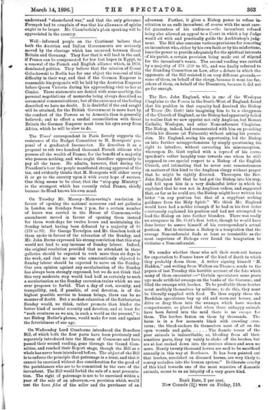On Wednesday Lord Cranborne introduced the Benefices Bill, of which
both the first parts have been previously and separately introduced into the House of Commons and have passed their second reading, gone through the Grand Com- mittee, and reached their Report stage, though the Bill as a whole has never been introduced before. The object of the Bill is to enforce the principle that patronage is a trust, and that it cannot be exercised without due consideration for the good of the parishioners who are to be committed to the care of the incumbent. The Bill would forbid the sale of a next presenta- tion. The right of patronage is not to be exercised within a year of the sale of an advowson,—a provision which would test the bona fides of the seller and the purchaser of an advoweon. Further, it gives a Bishop power to refuse in- stitution to an unfit incumbent, of course with the most care- ful guarantees of his unfitness,—the incumbent refused being also allowed an appeal to a Court in which a lay Judge would sit with and practically guide the Archbishop's judg- ment. The Bill also contains various provisions for removing an incumbent who, either by his own fault or by his misfortune, loses the power to provide adequately for the spiritual interests of his parish, a certain provision being made out of stipend for the incumbent's wants. The second reading was carried by a majority of 178 (259 to 81), and was finally referred to the Standing Committee on Law, after a debate in which the opponents of the Bill resisted it on very different grounds,— some of them, on behalf of the clergy, because it went too far, others of them, on behalf of the Dissenters, because it did not go far enough.






































 Previous page
Previous page